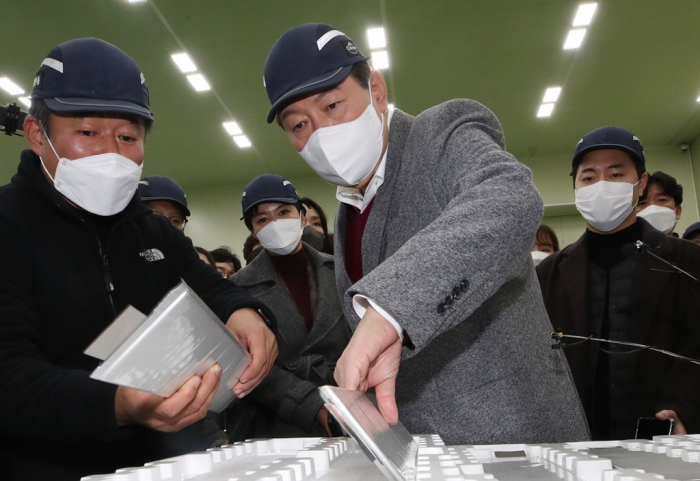Electric vehicles
Korea automakers fret over Yoon’s policy on combustion engine cars
Some industry experts doubt if Yoon’s pledge to allow only EV sales from 2035 is achievable
By Mar 14, 2022 (Gmt+09:00)
2
Min read
Most Read
LG Chem to sell water filter business to Glenwood PE for $692 million


Kyobo Life poised to buy Japan’s SBI Group-owned savings bank


KT&G eyes overseas M&A after rejecting activist fund's offer


StockX in merger talks with Naver’s online reseller Kream


Mirae Asset to be named Korea Post’s core real estate fund operator



South Korea’s automakers were on high alert as President-elect Yoon Suk-yeol pledged to ban new registrations of internal combustion engine cars from 2035 in the country, five years earlier than the local industry’s goal to stop selling such vehicles.
Local carmakers including the country’s top Hyundai Motor Co. tried to get more information on the promise as they see the target as too aggressive with sales of electric vehicles still low, according to industry sources on Sunday.
“The key is whether the pledge will be included in the new government’s task of the transition committee as it is,” said an industry source.
Yoon promised to prohibit new registrations of internal combustion engine vehicles from 2035 to deal with the climate environmental crisis during the election, according to the list of his commitments published by his People Power Party.
Once the pledge becomes the new government’s task, Hyundai has to revise its mid-to-long-term strategy for electrification immediately.
The automaker earlier unveiled a plan to sell 290,000 EVs by 2030 in South Korea, raising their portion of total sales to 36%. The company also aims to stop selling internal combustion engine models including hybrid cars in Europe from 2035. It is set to cease selling those vehicles by 2040 in other markets such as the United States, China and South Korea.
ACHIEVABLE TARGET?
Some doubted if Yoon’s pledge on the internal combustion engine cars is achievable. Last year, 100,439 EVs were newly registered, just 5.8% of the total number of newly registered vehicles in South Korea, according to the Ministry of Land, Infrastructure and Transport. Despite the growing demand for eco-friendly models, it is unrealistic to ramp up the portion to 100% in about 10 years, experts said.
“The government is gradually reducing subsidies for EVs, while their prices are unlikely to fall,” said another industry source. “It will cost a huge amount of taxpayers’ money to accomplish the goal.”
The pledge is expected to cut jobs in the country. EVs need about 30% fewer parts than internal combustion engine cars, so automakers have room for cut manpower in plants. That will escalate conflicts with unionized workers.
Auto parts makers have not been ready yet. A survey of 300 local parts makers by the Korea Automotive Industry Alliance in December 2021 showed 56.3% have yet to start businesses for EVs. Among those that have entered the market, 35.5% said it will take more than five years to start production. Insufficient charging infrastructures were another hurdle for the wider use of EVs.
Industry experts said the new government needs to alter the pledge. If Yoon sticks to the 2035 deadline for the goal, the authorities may introduce complementary measures such as including hybrid cars in an eco-friendly vehicle classification, they added.
“We agree with the direction of the pledge, but the speed is an issue,” said the source. “It is better to listen to the industry’s idea rather than setting a deadline and adding to the chaos.”
Write to Il-Gue Kim at black0419@hankyung.com
Jongwoo Cheon edited this article.
More to Read
Comment 1
LOG IN



